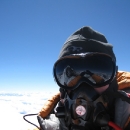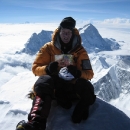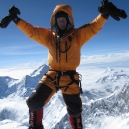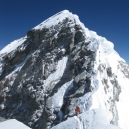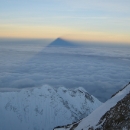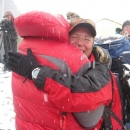Here is a small sample of the gear that I’ll be taking with me:
Clothing
|
| |
Down suit
|
As you can see in the Cho Oyu shot heading this site, I have a full body North Face Himalayan down suit to keep me warm at high altitudes, typically above 7000m. The suit has full side and rear zips, and plenty of internal pockets for keeping batteries and drinks warm, although they usually freeze anyway
|
 |
| |
Down jacket and trousers
|
For Base Camp and when its slightly lower altitudes, I have a high altitude Mountain Hardwear down jacket and trousers. These are extremely warm and compress into tiny bags called stuff sacks. If anything goes wrong with my down suit I could in theory wear this on my summit bid
|
 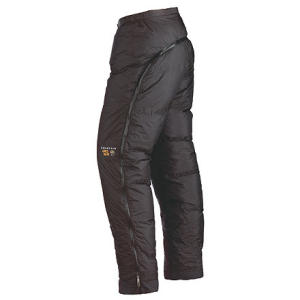 |
| |
Gore Tex trousers
|
These Arcteryrx Beta AR GoreTex trousers are for wearing between base camp and camp 2, before I put on the full outfit
|
 |
| |
Gore Tex outer shell jacket
|
I’ll be wearing my Arcteryx Beta AR jacket in rain when trekking to Base Camp and for snow and wind protection up higher
|
 |
| |
Fleece jacket
|
For warmth up to base camp and beneath my down suit I have my Monkey Man fleece jacket. Alix has a Lady version in silver
|
  |
| |
Soft Shell Jacket
|
This Arcteryx Gamma MX Hoodie is a great all round piece for technical climbing
|
 |
| |
Thermals
|
Lots of Capilene under-layers ranging in thickness from Patagonia
|
 |
| |
Trekking pants
|
I’ve got the same pair of North face trekking trousers I wore on my first trip to Base Camp in 1997 and they still work just fine for the trek in |
 |
| |
|
|
|
| |
|
|
|
Footwear
|
| |
High altitude climbing boots
|
Boots like these eliminate the need for gaiters, and are said to provide the best protection from the cold. I have the Millet Everest III which I wore on Cho Oyu. These will be used on most of the mountain and during the final push
|
 |
| |
Crampons
|
My Black Diamond Sabretooth crampons are essential for walking on steep snow or any ice. I’ll have them on from Base Camp onwards |
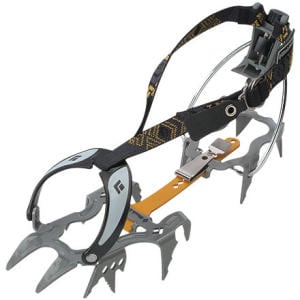 |
| |
Hiking boots
|
I have my trusty, broken in old Salomon boots for the trek to Base Camp from Lukla |
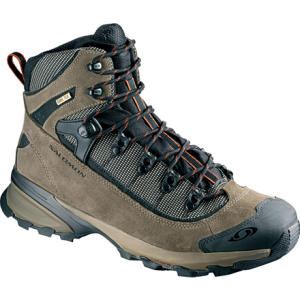 |
| |
Climbing boots
|
I’ve got Boreal Kangri 1 boots that I’ll be wearing lower down the mountain and on various training climbs. They have the support needed for High Alpine climbing but without the unwieldiness of my summit boots
|
 |
| |
Thick socks
|
Specialist thick expedition socks by TEKA |
 |
| |
|
|
|
| |
Thin socks
|
To use in combination with the thick socks, these help with warmth and comfort
|
 |
| |
Electric foot warmers
|
For the first time I’ve invested in a set of battery operated foot warmers from HET. These are like a mini-electric blanket with heat coming through an element mounted in a custom insole. The battery can either clip onto the back of your boot, or using special extension leads which run up your legs inside your down suit, they can sit in your chest pockets. This is also where you control the heat setting
|

 |
| |
Chemical warmers
|
I also have plenty of these which warm when they are opened from their packaging. They go between the liner sock and the outer sock |
 |
| |
|
|
|
Head and Hand Wear
|
| |
Fleece hats
|
For all round use |
 |
| |
Neck warmers
|
Better than scarves because they don’t come off – keep your ears warm too |
 |
| |
Balaclava
|
I have a Gorilla Outdoor Research two-piece velcro balaclava. This allows me to take off the front piece to use my oxygen mask or refix it to keep my lower face protected
|
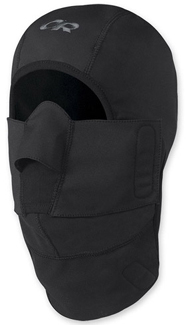 |
| |
Goggles
|
Julbo Cat 4 googles, for use when its cold – provide warmth and protect the eyes from the very harsh UV which can cause the excruciating snow blindness I experienced many years ago on Mont Blanc
|
 |
| |
Glacier sun glasses
|
When its a bit warmer, I’ll be using something like these to protect from UV. I have two pairs just in case
|
 |
| |
Sun hats
|
During the trek in and on some sections of the climb, its likely to be warm with harsh UV. A sun hat with a neck covering is essential |
 |
| |
Fleece gloves
|
Around camp and on lower parts of the trek I’ll generally be wearing fleece gloves for flexibility |
 |
| |
Inner gloves
|
I’ll be using polar tech Outdoor Research Polartec gloves underneath my down mitts when climbing high |
 |
| |
Down mitts
|
I have the new Outdoor Research Alti Mitts which I’ll wear while climbimg up high over the top of my various base layers. These are regarded as the best mittens available |
 |
| |
|
|
|
| |
Chemical hand warmers
|
Both Alix and I have plenty of chemical hand warmers (the type that warm for about 8 hours when exposed to the air). Alix especially plans to go through about ten a day at base camp! |
 |
Climbing Gear
|
| |
|
|
|
| |
Climbing harness
|
Worn so that I can use ropes (linked to other climbers or clipped onto fixed ropes). Alix also has a set to practice ice climbing on my rest days. I am using the lightweight Black Diamond Alpine Bod
|
 |
| |
Ice axe
|
My Camp Nanotech lightweight iceaxe will be clipped into my harness at all times. On flatter sections, I’ll be using it like a walking stick for balance (holding on where the blade meets the handle) and on steep sections I’ll be holding the handle and swinging it above our heads to dig into the ice we’re climbing. However, the main purpose of the ice axe is that if you fall and are sliding down the slope, you “self-arrest” by digging the blade into the ice as a brake. I’ll also be tying some flags onto it on summit day for the pictures hopefully!
|
 |
| |
Climbing rope
|
For roping up to each other while climbing. The rope will vary in thickness and strength depending on the type of terrain |
 |
| |
Carabiners
|
For clipping into fixed ropes, and attaching ropes in general. I’ll have both locking and snap-lock versions
|
 |
| |
Figure of 8
|
For abseiling down steep sections |
 |
| |
Ascender / Jumar
|
Used for climbing fixed rope – they slide upwards but not downwards, allowing you to pull yourself up on the rope
|
 |
| |
Head lamp
|
A lot of the climbing will begin at night, so a strong head torch with a long-life battery in very important |

|
| |
Oxygen Mask & Tanks
|
On the summit push, I’ll be using supplemental oxygen (see the page on oxygen at altitude). Oxygen tanks also accompany the mask and regulator shown here |
 |
Camping and Carrying Gear
|
| |
Climbing / trekking packs
|
I’ll be using the Pod Thin Ice 50 pack for my training and final climbs. Although I won’t need to carry everything as our tent, oxygen, etc will be carried in ahead of us, I’ll still be carrying our personal equipment, clothes, water, etc. On summit day, we’ll need the packs to carry our oxygen tanks
|
 |
| |
Tents
|
Tents like these will be used above base camp. At base camp they will be bigger, less robust versions |
 |
| |
Stove
|
Above base camp, we’ll be using a stove like this to cook food and, more importantly, to melt water from snow which will have to be done every night
|
 |
| |
Trekking poles
|
My Leki Ultra light-weight and adjustable for ascents and descents, I’ll be using these for trekking and climbing |
 |
| |
|
|
|
Sleeping Gear
|
| |
Down sleeping bag – heavy
|
My Mountain Hardware Wraith bag zips entirely around my head for a completely snug feel |
 |
| |
|
|
|
| |
Silk sleeping bag liners
|
These are supposed to increase the body temperature by 5 degrees |
 |
| |
Therma-a-rests
|
These provide the most comfortable night’s sleep when camping – but can be a bit cold so will probably only be used at lower camps and by Alix
|
 |
| |
Foam Mats
|
Not as comfortable but much warmer for high camps – will possibly use in combination with the therm-a-rests at lower camps for extra comfort |
 |
| |
|
|
|
Miscellaneous Items
|
| |
Pasta!
|
I powered up to the summit of Cho Oyu after managing to cook some tortellini at Camp 3 and I’ll be bringing a tiny bit again hoping to give myself some energy before my summit bid. However, altitude tends to destroy appetite… |
 |
| |
High speed satellite modem
|
We’re using the BGAN Wideye systen to link up all our communications gear to satellites, stay in touch and update this site |
 |
| |
Camel Pack
|
This is a water bag kept inside my rucksack, attached to an over-the-shoulder straw that allows me to drink without stopping moving. Hydration is really important at altitude so this is a necessity
|
 |
| |
Communications Box (Pelican case)
|
HET created a hardbox in which to transport and store all our communications equipment |
 |
| |
Solar panels
|
This is how we’ll be powering all our communications equipment at base camp, and how Alix will be powering her laptop. We have a couple in different sizes for different pieces of equipment
|
 |
| |
ACER Computer
|
Customized ultralight laptop with solid state hard drive running XP. It has been prepared for satellite communication by HET and Alix. The shock-proof solid state hard drive, low weight and low power consumption makes this laptop ideal for high-altitude and other expedition use
|
 |
| |
Thuraya Satellite phones
|
We’ll both have these phones to communicate with each other and the outside world. Mine is one of the lightest satellite phones in the world, the Thuraya TG 2520, and Alix’s is an older model that she’ll be using on the trek and at base camp
|
  |
| |
PDA
|
I’ll be using this to send photos and updates while on climbs to our website |
 |
| |
Girlfriend
|
Highest quality top of the range girlfriend, great for cold nights and general inspiration |
 |
| |
|
|
|
| |
|
|
|
| |
|
|
|
| |
|
|
|
| |
|
|
|
